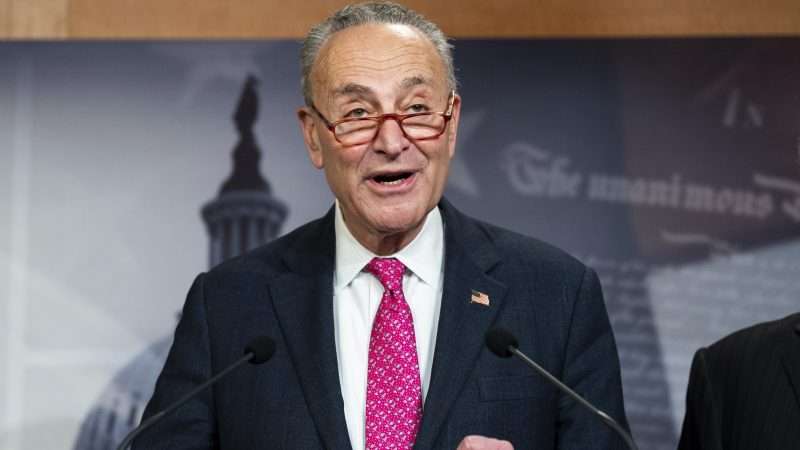
While Democrats have not yet abolished the filibuster, they have rejected Republican demands that they commit to maintaining the Senate’s current rules over the next two years. Some Democrats are even threatening to blow up those rules if Republicans try to filibuster President Joe Biden’s agenda. However, doing so will make the Senate even more dysfunctional than it is now.
Ending the filibuster will make it harder for senators to adjudicate their constituents’ concerns, to negotiate with one another as equals, and to compromise. The Senate is one of only two places in the federal government where elected officials can gather to reconcile their disagreements and make collective decisions. And the Senate’s rules are vital to making that debate process work.
The Senate’s rules are designed to facilitate lawmaking by pushing senators to agree with one another. They do so by making the legislative process more predictable and reliable than it would be otherwise. That makes it possible for senators to form expectations about what will happen in the future and, by extension, make it easier to compromise in the present. And it gives senators leverage in negotiations. Those rules also lead to stable policy by reconciling losers in a debate to its outcome. For example, Sen. Richard Russell (D–Ga.) led the filibuster against the Civil Rights Act of 1964. After he failed to stop the bill, Russell accepted the outcome as legitimate and urged his fellow southern senators to do so as well.
Breaking those rules to abolish the filibuster would make it harder, not easier, for the Senate to function.
Unlike in the House of Representatives, where a simple majority can vote to end debate at any point, the Senate’s rules require a three-fifths majority to end debate over senators’ objections. The rules require an even larger two-thirds majority to end debate when the underlying legislation is a proposal to change the Senate rules. It thus takes more votes to end a filibuster (typically 60 senators) than it does to pass a bill (typically 51 senators).
In the past, senators rightly understood that their ability to filibuster was not absolute; it merely gave individual senators leverage to force their colleagues, the House, or the administration to negotiate with them in a debate. That is why legislation approved by the Senate almost always included minority-favored provisions in addition to those supported by the majority. In that way, the filibuster facilitated negotiation and compromise.
That changed as the gap between Democrats and Republicans widened in the late 20th century. Once a source of leverage that specific senators could use in negotiations, the filibuster morphed into a veto that Senate minorities could use to block legislation favored by the majority. Even the prospect of a filibuster is a powerful force—in recent years, gun-related legislation has stalled in the Senate, not because a committed minority is filibustering it but because senators on both sides are threatening to filibuster it.
Yet despite how it may operate, the filibuster is not really a veto. It does not level the playing field between the majority and minority sides in debates. It merely grants a senator, or senators, the opportunity to speak on the Senate floor for as long as possible. Using the filibuster to obstruct the majority regularly requires minority-party senators to be willing to expend considerable effort to succeed. And the filibuster cannot cause gridlock in a debate of reasonable length because no two sides in any debate are evenly matched in terms of their members’ effort. One group of senators must always prevail after a debate. Gridlock only occurs when senators do not debate.
The filibuster operates like a veto today because Senate majorities are unwilling to use the rules to pass legislation. Senators may temporarily delay particular aspects of that agenda by speaking on the floor. But they cannot prevent the Senate from voting in perpetuity, because filibustering imposes physical and opportunity costs and because of the procedural limitations contained in the Senate’s existing rules and practices.
For example, Rule XIX limits how many times a senator may speak on the floor in a debate and it stipulates that when a senator is no longer able to talk, he or she has no choice but to yield the floor. At that point, the Senate votes on the underlying question unless another senator seeks recognition and then speaks for as long as he or she desires and is able. While the length of the Senate’s business delay is proportional to the number of senators who participate in a filibuster, there is no point at which business gets delayed indefinitely, since individual senators can speak for only a finite period. When no senator seeks recognition in a debate, the Senate must vote.
The Senate will rarely need to go to such lengths to overcome filibusters because simply debating a bill before trying to pass it creates buy-in among senators and builds bipartisan support for it. Legislation on issues like COVID-19 relief, criminal justice reform, privacy, and trade can pass on large bipartisan votes if leaders let the process play out instead of trying to control it. A freewheeling debate in which all senators can participate makes it easier for cross-partisan coalitions to emerge. And it also helps constituents assign responsibility for policy outcomes and hold their elected officials accountable in the next election.
Abolishing the filibuster will therefore not make it easier for senators to negotiate and compromise. Instead, it will give majorities an incentive to craft major bills behind closed doors and pass them through the chamber as quickly as possible by limiting senators’ ability to participate in the legislative process. The result will be to make the Senate even more dysfunctional than it is now.
from Latest – Reason.com https://ift.tt/3j3hPMA
via IFTTT